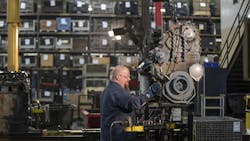This is Part One of a three-part story. Click here to see Part Two.
Emission regulations will become more stringent in 2027, and the cost of new trucks will rise even higher. Interest rates are already high. And remember when you sell your current trucks that used prices have tumbled from their eye-popping highs from a couple of years ago. In other words, there are several reasons to encourage fleets to hang on to their trucks a bit longer than in the past.
Data suggests some already are. The average life cycle of a truck-tractor has crept up into a prime overhaul window. According to a June 2024 report published by the American Transportation Research Institute (ATRI), the average trade cycle on a truck/tractor is 7.5 years (673,995 miles).
If this trend continues, could that lead to an increased demand for engine overhauls over the next several years? That’s tough to say at the end of 2024.
Still, it’s likely to be a viable option for fleets to evaluate and one of the many variables that collectively play into the overall ROI equation for a fleet asset, including ownership costs, maintenance and repair costs, uptime and reliability, fuel efficiency, safety, etc. In some instances, the best ROI could point to an overhaul.
Read more: Trucking's Fountain of Youth: Repairs and replacements
“If you can maintain a fleet really well so trucks are able to operate long past the initial expenditure, it can be a huge boon to cash flow,” said Alejandro Paret, owner of Diesel Rebuild Kits, a distributor of top aftermarket parts brands.
Signs an overhaul could be in order
For fleets that run the numbers and make an educated decision to keep a truck in operation longer, it’s important to know what their options are. If an engine hasn’t suffered major damage and is only showing signs of normal wear and tear, an overhaul is one of those options.
Mileage is the first indicator.
“It always used to be that million-mile mark,” said Jim Madich, engine service supervisor at Blaine Brothers, based in Blaine, Minnesota, which provides parts, repair, maintenance, and towing services in the region. “Lately, we’ve seen that a lot of trucks with aftertreatment systems are not lasting that long. We advise our customers to start watching for signs that an overhaul could be needed any time after 500,000 miles.”
What are some of those signs?
Michael Young, powertrain product marketing manager at Daimler Truck North America (DTNA), said drivers will often complain about power loss and reduced fuel mileage. Increased oil consumption and coolant usage are also at the top of the list. Madich added that fleets that do oil sampling may learn there is a lot of iron, copper, or metals in the oil.
Other signs that an overhaul is needed include blue, black, or white exhaust; engine knocking; poor engine braking; and low oil pressure.
In addition, it’s important to understand the condition of the rest of the vehicle before making an overhaul investment. Overhauling an engine might not make sense if the transmission is also on the verge of failure, the chassis is in rough shape, or other costly repairs will be needed in the coming months. If one or more of these is the case, it might make more sense to invest in a new truck. But if all of those other items check out okay, and the fleet is looking to get at least a few more years of service out of the truck, an engine overhaul could provide a solid ROI.
In Part Two of this story, we'll discuss the equipment technicians need to perform an engine overhaul and how to consider what overhaul they should do.
About the Author

Gregg Wartgow
Gregg Wartgow is a freelancer who Fleet Maintenance has relied upon for many years, writing about virtually any trucking topic. He lives in Brodhead, Wisconsin.
